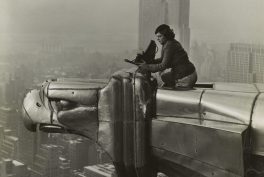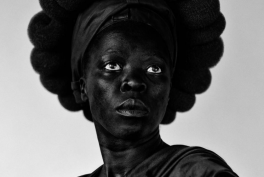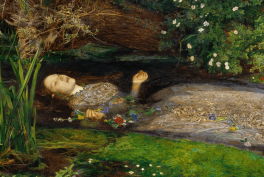Celebrating Community and Resilience
But not everything tells a story of rupture. Many of the exhibition’s strongest moments celebrate community and resilience. Vanley Burke’s portraits of multicultural Birmingham are vibrant with pride and intimacy, and Roy Mehta’s work explores the complexities of identity within these communities.
The show deftly interweaves the personal and political. Sutapa Biswas and Roshini Kempadoo employ portraiture to confront and reframe diasporic identities, their works layered with poetic defiance. Meanwhile, Joy Gregory and Maxine Walker create self-portraits to celebrate Black femininity. These demurely radical images communicate a defiance that refuses to be diminished.
The exhibition’s handling of queer representation is equally poignant, especially when viewed against the backdrop of the AIDS crisis and Section 28. Sunil Gupta’s ‘Pretended’ Family Relationships juxtaposes intimate portraits with oppressive legislative text, creating a deeply moving tension between presence and erasure. Ajamu X and Rotimi Fani-Kayode reclaim the eroticized Black male body with fierce tenderness, their images vibrating with desire and defiance.
New Era of Creativity
As the exhibition winds toward its conclusion, it embraces the cultural vitality of countercultural movements. Ingrid Pollard and Franklyn Rodgers bring the riotous energy of underground performances and club culture to life. The exuberant creativity in these images feels like an act of resistance—a refusal to be silenced, even as the country struggles under the weight of conservative policies. This crescendo of energy leads seamlessly into the fashion photography of Wolfgang Tillmans and Jason Evans, whose bold, youthful aesthetic signals the dawn of a new cultural era.
Portrait of a Nation
What emerges is not a neat narrative but a fractured, multifaceted picture of Britain—a nation in flux. This is the exhibition’s great triumph. It does not attempt to simplify the complexities of the 1980s but instead embraces them, presenting a decade as a series of shifting perspectives. Each photograph holds a fragment of a larger truth, and together, they create a portrait of a country caught between despair and renewal. At Tate Britain, the lenses do not merely document; they transform, reminding us that every image is an act of witness and a gesture of imagination.
The 80s: Photographing Britain is open at Tate Britain, London, until May 5, 2025.















